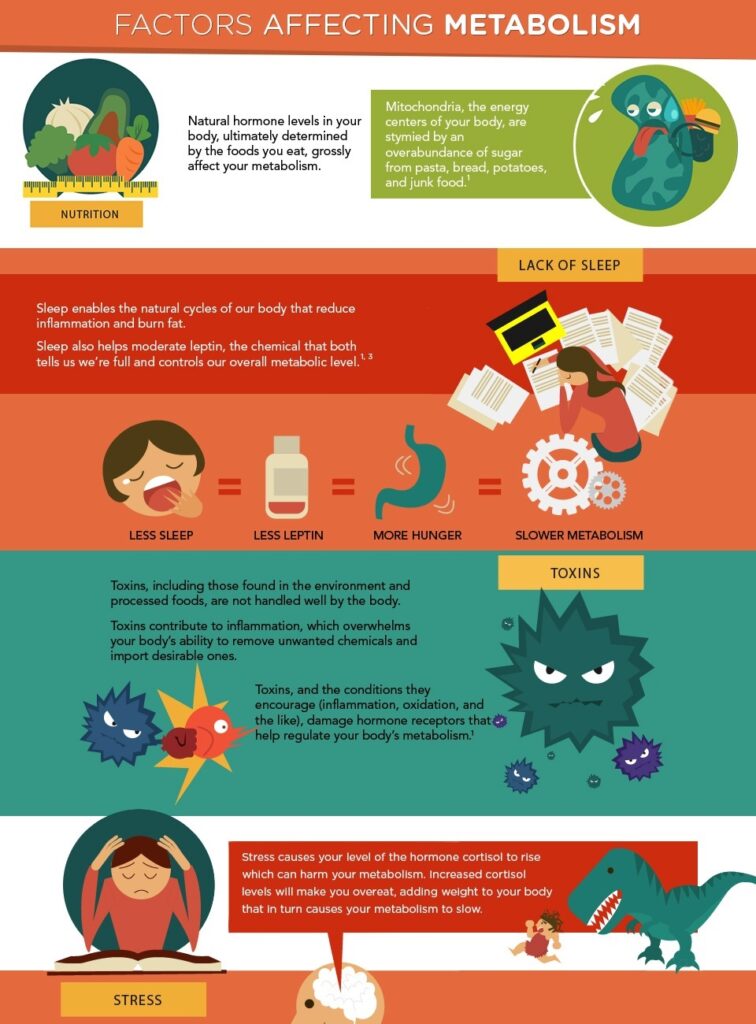Boosting Your Metabolism: Strategies for Improving a Sluggish Metabolic Rate

- Should You Train To Muscle Failure Every Set? What You Need To Know - March 4, 2025
- Nutrition in a Hurry: Top Post-Workout Snacks for Active People - February 20, 2025
- 15 Healthy Meal Prep Recipes: Your Weight Loss Made Easy - February 18, 2025
Are you tired of feeling sluggish and low on energy? It may be time to give your metabolism a boost! Your metabolism is responsible for converting calories into energy, and factors such as genetics, age, activity level, and lifestyle habits can affect its efficiency. If you find that your metabolism is on the slower side, there are strategies you can use to rev it up. From incorporating strength training and cardio exercises into your routine to making sure you’re getting enough sleep and consuming the right foods, this article will provide you with a comprehensive guide on how to overcome a sluggish system and get your metabolism running at its best. Plus, we’ll explore the role of coffee, tea, green tea, and MCT oil in giving your metabolism an extra kick. So get ready to feel more energized and start implementing these strategies today!
Factors that Affect Metabolic Rate
Metabolism is the body’s ability to convert calories into energy. It is influenced by various factors, including genetics, age, gender, activity level, muscle/fat ratio, thyroid levels, estrogen levels, and lifestyle habits.
Genetics
Your genetic makeup plays a significant role in determining your metabolic rate. Some individuals are born with a naturally fast metabolism, allowing them to burn calories more efficiently. On the other hand, some people have a slower metabolism due to their genetic predisposition. While you cannot change your genetics, understanding this factor can help you make more informed choices to manage your metabolic rate effectively.
Age
As you age, your metabolic rate tends to slow down. This is primarily because of the gradual loss of muscle mass and a decrease in physical activity. Muscles are more metabolically active than fat, meaning they burn more calories even at rest. Therefore, it is essential to incorporate exercise into your routine as you age and focus on maintaining muscle mass to counteract the natural decline in metabolism.
Gender
Gender also plays a role in metabolic rate. Men generally have a higher metabolic rate compared to women. This is largely attributed to differences in body composition, hormonal levels, and muscle mass. Men typically have higher levels of testosterone, which promotes muscle growth and higher metabolic activity. However, it is important to note that individual variations exist within both genders, and lifestyle choices can have a significant impact on metabolic rate.
Activity Level
Your activity level is a crucial factor in determining your metabolic rate. Engaging in regular physical activity can boost your metabolism and help you burn calories more efficiently. Both aerobic exercise and strength training can contribute to an increased metabolism. Aim for at least 150 minutes of moderate-intensity aerobic activity or 75 minutes of vigorous-intensity aerobic activity each week, along with muscle-strengthening activities on two or more days.
Muscle/Fat Ratio
The ratio of muscle to fat in your body also affects your metabolic rate. As mentioned earlier, muscle is more metabolically active than fat. Therefore, individuals with a higher muscle mass tend to have a faster metabolism. On the other hand, having a higher percentage of body fat can lead to a slower metabolic rate. Incorporating resistance training exercises into your routine can help increase muscle mass and improve your metabolism.
Thyroid Levels
The thyroid gland plays a crucial role in regulating metabolism. It produces hormones that control how your body uses energy. If your thyroid levels are imbalanced, it can lead to a sluggish metabolism. Hypothyroidism, a condition where the thyroid gland does not produce enough hormones, is associated with a slower metabolism. If you suspect thyroid issues, consult with a healthcare professional for proper evaluation and treatment.
Estrogen Levels
Estrogen, a hormone primarily found in women, can also affect metabolic rate. Fluctuations in estrogen levels, such as during menopause, can result in a decrease in metabolism. Estrogen helps regulate various aspects of metabolism, including fat storage and insulin sensitivity. Maintaining hormonal balance through healthy lifestyle habits and discussing any concerns with your healthcare provider can help support a healthy metabolism.
Lifestyle Habits
Your lifestyle habits significantly impact your metabolic rate. Poor dietary choices, excessive alcohol consumption, smoking, and inadequate sleep can all contribute to a slower metabolism. Consuming a balanced diet rich in whole foods, limiting alcohol intake, quitting smoking, and prioritizing sufficient sleep can all work together to support a healthy metabolic rate. Regular meal timing and portion control can also help regulate metabolism.
Causes of a Slow Metabolism

Several factors can contribute to a slow metabolism, leading to difficulties in maintaining a healthy weight and overall well-being.
Older Age
As mentioned earlier, metabolism tends to naturally slow down with age. With each passing decade, you may observe a decrease in metabolic rate. This is primarily because of the loss of muscle mass over time. To counteract this effect, it becomes increasingly important to engage in regular exercise and strength training to preserve muscle mass and support a healthy metabolism.
Decreases in Muscle Mass
Loss of muscle mass, also known as sarcopenia, can significantly contribute to a slower metabolism. As you age or become less physically active, your body may naturally lose muscle mass. Since muscles burn more calories than fat, a decrease in muscle mass can lead to a reduced metabolic rate. Incorporating resistance training into your fitness routine can help prevent muscle loss and maintain a faster metabolism.
Low Activity Levels
A sedentary lifestyle characterized by minimal physical activity can contribute to a slow metabolism. When you lead a primarily inactive life, your body does not need to burn as many calories for energy. Over time, this can result in a slower metabolic rate. It is essential to find ways to incorporate movement into your everyday routine, such as taking regular walks, using the stairs instead of the elevator, or participating in active hobbies.
Prolonged Fasting
Long periods of fasting or severely restricting calorie intake can cause the body to conserve energy and slow down the metabolism. This is a survival mechanism that allows the body to preserve energy when food is scarce. While occasional fasting can have potential health benefits, prolonged or extreme fasting can lead to a reduced metabolic rate. It is important to approach fasting regimens with caution and seek guidance from a healthcare professional if necessary.
Low Thyroid Levels
Hypothyroidism, a condition characterized by an underactive thyroid gland, can significantly impact metabolic rate. When the thyroid gland does not produce enough hormones, it can lead to a slowdown in metabolism. Symptoms of hypothyroidism may include fatigue, weight gain, and difficulty losing weight. If you suspect thyroid issues, it is essential to consult with a healthcare professional for proper diagnosis and treatment.
Decreases in Estrogen
Fluctuations in estrogen levels, such as during menopause, can contribute to a slower metabolism. Estrogen plays a role in regulating various aspects of metabolism, including fat distribution and insulin sensitivity. As estrogen levels decline, it can be more challenging to maintain a healthy weight and manage metabolism. Implementing lifestyle strategies to support hormonal balance, such as a healthy diet and regular exercise, can be beneficial during this period.
Genetics
Genetics also play a role in determining one’s metabolic rate. Some individuals may have a genetic predisposition to a slower metabolism, making it more challenging to maintain a healthy weight. While you cannot change your genetics, understanding this factor can help you make more informed choices and adopt habits that can support a healthy metabolism.
Strategies to Increase Metabolism
If you’re looking to boost your metabolism, there are several strategies you can incorporate into your daily routine. Remember that different strategies work for different individuals, so it’s important to find what suits you best.
Lifting Weights
Strength training or resistance exercises are excellent for increasing muscle mass and boosting metabolism. When you engage in weightlifting, your muscles are challenged, which leads to muscle growth and increased calorie burning. Aim to include two to three strength training sessions per week, focusing on all major muscle groups.
Doing Cardiovascular Exercise
Cardiovascular exercises, such as running, cycling, or swimming, help elevate your heart rate and burn calories. Engaging in cardio exercises regularly can increase your metabolism, both during the activity and for the period after. Aim for at least 150 minutes of moderate-intensity aerobic activity or 75 minutes of vigorous-intensity aerobic activity each week.
Trying HIIT Workouts
High-Intensity Interval Training (HIIT) involves alternating between short bursts of intense exercise and periods of rest or low-intensity activity. HIIT workouts are known to be highly effective in boosting metabolism and burning calories in a shorter amount of time. Incorporating HIIT workouts into your fitness routine can help increase your metabolic rate and improve overall fitness.
Eating Enough Calories
Restricting calories excessively can lead to a slower metabolism as the body tries to conserve energy. It is important to eat enough calories to support your body’s needs and maintain a healthy metabolic rate. Consult with a healthcare professional or registered dietitian to determine the appropriate caloric intake for your goals and needs.
Consuming Fiber-Rich Plant Foods
Fiber-rich plant foods, such as fruits, vegetables, whole grains, and legumes, take longer to digest and can help increase metabolism. These foods provide essential nutrients while keeping you feeling fuller for longer, which can aid in weight management. Aim to incorporate a variety of fiber-rich plant foods into your meals and snacks.
Getting Enough Sleep
Adequate sleep is crucial for overall health, including metabolism. Lack of sleep can disrupt hormonal balance, leading to increased appetite and a slower metabolic rate. Aim for seven to nine hours of quality sleep each night to support a healthy metabolism and overall well-being.
Balancing Hormones
Maintaining hormonal balance can have a significant impact on metabolism. Along with lifestyle habits that support hormonal health, certain strategies such as managing stress levels, maintaining a healthy weight, and addressing hormonal imbalances through medical intervention if necessary, can help balance hormones and support a healthy metabolic rate.
Eating More Protein

Protein is known to increase metabolism through its thermic effect. It requires more energy to digest and metabolize protein compared to carbohydrates or fats. Including protein-rich foods, such as lean meats, poultry, fish, dairy products, legumes, and tofu, can help boost your metabolism and keep you feeling satisfied.
Standing or Walking More
Simply incorporating more movement into your day, such as standing instead of sitting or taking short walking breaks, can help increase your metabolic rate. These small lifestyle changes add up over time and contribute to overall calorie burn and a healthier metabolism.
Incorporating Coffee, Tea, Green Tea, or MCT Oil into Your Diet
Certain beverages, such as coffee, tea, and green tea, contain compounds that can temporarily boost metabolism. These beverages contain caffeine and catechins, which have a thermogenic effect and can increase calorie burn. MCT (medium-chain triglyceride) oil is another popular choice known to increase metabolism. It can be added to beverages or used in cooking and baking.
In conclusion, metabolic rate is influenced by various factors such as genetics, age, gender, activity level, muscle/fat ratio, thyroid and estrogen levels, as well as lifestyle habits. A slow metabolism can be caused by older age, decreases in muscle mass, low activity levels, prolonged fasting, low thyroid and estrogen levels, and genetics. However, there are strategies to increase metabolism, including lifting weights, doing cardiovascular exercise, trying HIIT workouts, eating enough calories, consuming fiber-rich plant foods, getting enough sleep, balancing hormones, eating more protein, standing or walking more, and incorporating beverages like coffee, tea, green tea, or MCT oil into your diet. By understanding these factors and implementing lifestyle changes, you can support a healthy metabolism and achieve your wellness goals.
Table of Contents







